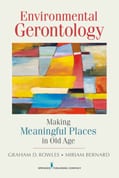The text is grounded in the conceptual and theoretical underpinnings of current research on place attachment, environmental meaning, and community living in later life. Emphasis is placed on how to design residential spaces that facilitate the development of a sense of place or home, and investigation is made into the kinds of lifestyles such spaces foster and support. A major theme pervading the text is the juxtaposition of private and public space. The book also addresses such themes as the transformation of spaces into places of personal identification and attachment, the need for shared intergenerational spaces, and consideration of diverse populations when designing public spaces. The book also considers how emerging public policy agendas affect the development and management of environments for the elderly. Environmental Gerontology includes the contributions of scholars in anthropology, architecture, economics, education, geography, gerontology, planning, psychology, sociology, and numerous health sciences, who hail from North America, Europe, and Asia. With its strong interdisciplinary focus, this text offers innovative and judicious recommendations for the creation of community environments that are truly beneficial for older adults.
